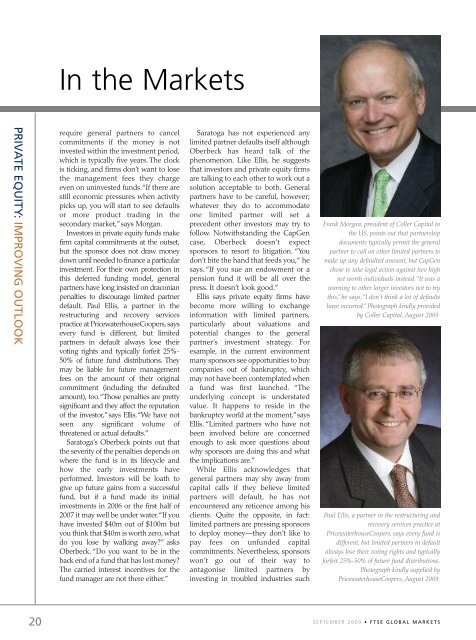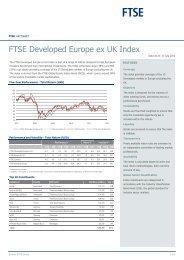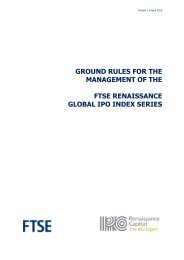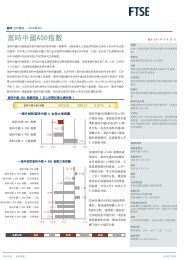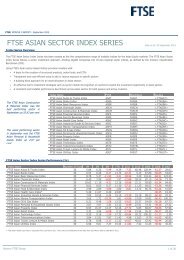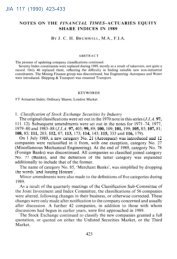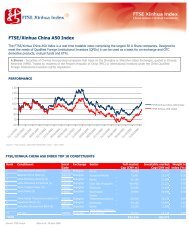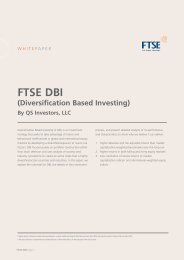You also want an ePaper? Increase the reach of your titles
YUMPU automatically turns print PDFs into web optimized ePapers that Google loves.
PRIVATE EQUITY: IMPROVING OUTLOOK<br />
20<br />
In the Markets<br />
require general partners to cancel<br />
commitments if the money is not<br />
invested within the investment period,<br />
which is typically five years. The clock<br />
is ticking, and firms don’t want to lose<br />
the management fees they charge<br />
even on uninvested funds.“If there are<br />
still economic pressures when activity<br />
picks up, you will start to see defaults<br />
or more product trading in the<br />
secondary market,”says Morgan.<br />
Investors in private equity funds make<br />
firm capital commitments at the outset,<br />
but the sponsor does not draw money<br />
down until needed to finance a particular<br />
investment. For their own protection in<br />
this deferred funding model, general<br />
partners have long insisted on draconian<br />
penalties to discourage limited partner<br />
default. Paul Ellis, a partner in the<br />
restructuring and recovery services<br />
practice at PricewaterhouseCoopers, says<br />
every fund is different, but limited<br />
partners in default always lose their<br />
voting rights and typically forfeit 25%-<br />
50% of future fund distributions. They<br />
may be liable for future management<br />
fees on the amount of their original<br />
commitment (including the defaulted<br />
amount), too.“Those penalties are pretty<br />
significant and they affect the reputation<br />
of the investor,”says Ellis.“We have not<br />
seen any significant volume of<br />
threatened or actual defaults.”<br />
Saratoga’s Oberbeck points out that<br />
the severity of the penalties depends on<br />
where the fund is in its lifecycle and<br />
how the early investments have<br />
performed. Investors will be loath to<br />
give up future gains from a successful<br />
fund, but if a fund made its initial<br />
investments in 2006 or the first half of<br />
2007 it may well be under water.“If you<br />
have invested $40m out of $100m but<br />
you think that $40m is worth zero, what<br />
do you lose by walking away?” asks<br />
Oberbeck. “Do you want to be in the<br />
back end of a fund that has lost money?<br />
The carried interest incentives for the<br />
fund manager are not there either.”<br />
Saratoga has not experienced any<br />
limited partner defaults itself although<br />
Oberbeck has heard talk of the<br />
phenomenon. Like Ellis, he suggests<br />
that investors and private equity firms<br />
are talking to each other to work out a<br />
solution acceptable to both. General<br />
partners have to be careful, however;<br />
whatever they do to accommodate<br />
one limited partner will set a<br />
precedent other investors may try to<br />
follow. Notwithstanding the CapGen<br />
case, Oberbeck doesn’t expect<br />
sponsors to resort to litigation. “You<br />
don’t bite the hand that feeds you,“ he<br />
says. “If you sue an endowment or a<br />
pension fund it will be all over the<br />
press. It doesn’t look good.”<br />
Ellis says private equity firms have<br />
become more willing to exchange<br />
information with limited partners,<br />
particularly about valuations and<br />
potential changes to the general<br />
partner’s investment strategy. For<br />
example, in the current environment<br />
many sponsors see opportunities to buy<br />
companies out of bankruptcy, which<br />
may not have been contemplated when<br />
a fund was first launched. “The<br />
underlying concept is understated<br />
value. It happens to reside in the<br />
bankruptcy world at the moment,”says<br />
Ellis. “Limited partners who have not<br />
been involved before are concerned<br />
enough to ask more questions about<br />
why sponsors are doing this and what<br />
the implications are.”<br />
While Ellis acknowledges that<br />
general partners may shy away from<br />
capital calls if they believe limited<br />
partners will default, he has not<br />
encountered any reticence among his<br />
clients. Quite the opposite, in fact:<br />
limited partners are pressing sponsors<br />
to deploy money—they don’t like to<br />
pay fees on unfunded capital<br />
commitments. Nevertheless, sponsors<br />
won’t go out of their way to<br />
antagonise limited partners by<br />
investing in troubled industries such<br />
Frank Morgan, president of Coller Capital in<br />
the US, points out that partnership<br />
documents typically permit the general<br />
partner to call on other limited partners to<br />
make up any defaulted amount, but CapGen<br />
chose to take legal action against two high<br />
net worth individuals instead.“It was a<br />
warning to other larger investors not to try<br />
this,” he says,“I don’t think a lot of defaults<br />
have occurred.” Photograph kindly provided<br />
by Coller Capital, August 2009.<br />
Paul Ellis, a partner in the restructuring and<br />
recovery services practice at<br />
PricewaterhouseCoopers, says every fund is<br />
different, but limited partners in default<br />
always lose their voting rights and typically<br />
forfeit 25%-50% of future fund distributions.<br />
Photograph kindly supplied by<br />
PricewaterhouseCoopers, August 2009.<br />
S E P T E M B E R 2 0 0 9 • F T S E G L O B A L M A R K E T S


